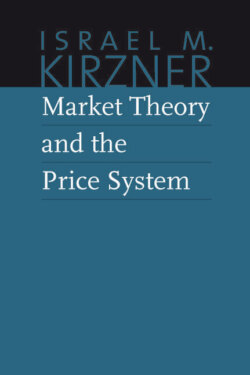Читать книгу Market Theory and the Price System - Israel M. Kirzner - Страница 34
На сайте Литреса книга снята с продажи.
SOCIETY AND THE ECONOMIC PROBLEM
ОглавлениеEconomists frequently speak of the economic problem facing society. What they usually have in mind is something closely similar to the economic problem faced by individuals. But the legitimacy of this interpretation of the term “economic problem” is by no means clear, and the limitations on its use in this sense must be understood. Discussions that deal with the economic problem facing society assume a group of human beings, on the one hand, having numerous different desires for consumer goods and services and, on the other hand, having command of a body of productive resources. The economic problem facing the society is, once again, that of securing efficiency. The problem consists in constructing an organized social system that will most efficiently utilize the limited resources of “society” for the satisfaction of the desires of “society” for consumer goods and services. Once again a successful solution of this problem calls for “consistency”—a pattern of activity and production that should faithfully reflect the respective weights assigned to each of the goals that it is desired to satisfy.1
The limitations surrounding this use of the term “economic problem” arise from the fact that society is made up of numerous individuals. Each individual can be viewed as independently selecting his goal program. And in a market economy especially, each individual adopts his own courses of action to achieve his goals. It is therefore unrealistic to speak of society as a single unit seeking to allocate resources in order to faithfully reflect “its” given hierarchy of goals. Society has no single mind where the goals of different individuals can be ranked on a single scale.
Nevertheless, there is a sense where one form of societal organization can be termed “more efficient” than another. For example, a market economy, as we shall see, is unquestionably more “efficient” than a system of self-sufficient individual “economies,” because each individual shows by his voluntary participation in the market that he is better off under the former than the latter. Thus, each individual finds he can most efficiently solve his own economic problem by cooperating with other individuals through division of labor and the market. Any form of voluntary social cooperation emerges only because each participant seeks in this way to further his own goals. If he participates in a social system of any kind, he does so in the interests of his own efficiency; his participation is a method of solving his own economic problem.
We will be speaking of the efficiency or inefficiency of a social system in this sense. We are not invoking the notion of a society having its goals in any sense apart from the goals of the individuals making up the society. Efficiency for a social system means the efficiency with which it permits its individual members to achieve their several goals.
